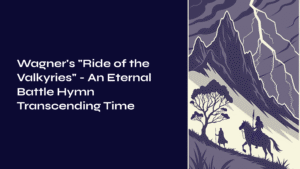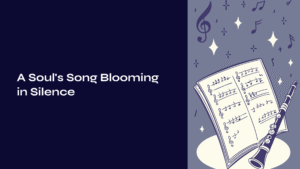Table of Contents

The Tremor of a Night Remembered
Some music doesn’t grab you from the first note. Instead, it approaches quietly, like someone whispering in your ear, and before you know it, you realize it’s controlling your heartbeat. Edvard Grieg’s “In the Hall of the Mountain King” is exactly that kind of piece.
I remember the strange sensation when I first heard it. The eerie melody created by the low strings penetrated my ears while I felt as though I was being dragged deep into an underground cave. And then gradually, very gradually, that wave of sound began to grow. At some point, I found myself running within that music. No, perhaps I should say I was being chased.
Every time I listen to this piece, I wonder: how much darkness lies hidden within the human psyche? And sometimes, how seductively can that darkness dance?
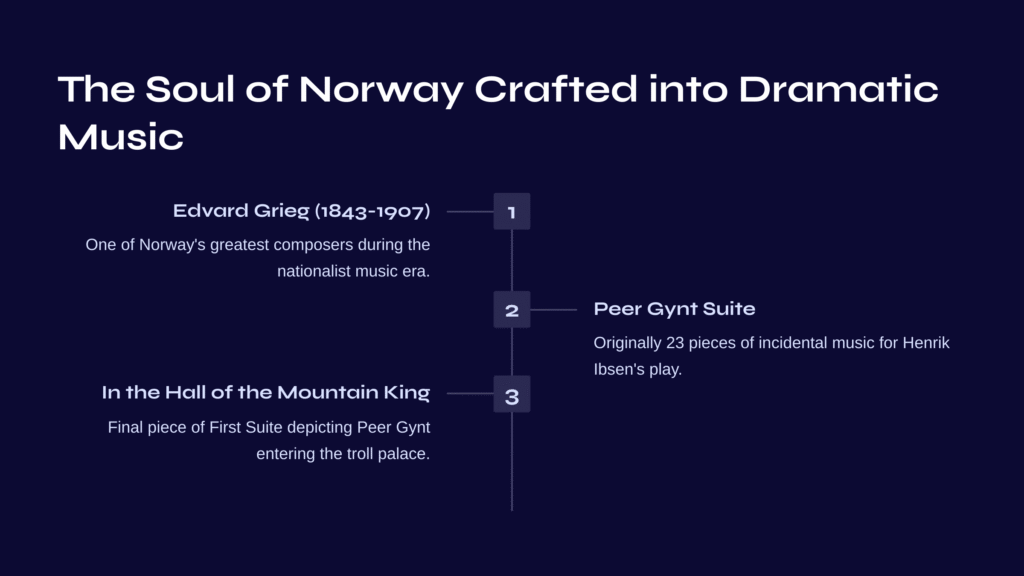
The Soul of Norway Crafted into Dramatic Music
Edvard Grieg (1843-1907) was one of the greatest composers Norway ever produced. The late 19th century, when he lived, was an era when nationalist music flourished throughout Europe. Composers from various countries strived to capture their unique cultures and legends in music, and Grieg too found inspiration in Norwegian folk songs and folklore.
The “Peer Gynt Suite” was originally incidental music that Grieg composed for Henrik Ibsen’s play of the same name. Ibsen’s drama depicted the adventures of Peer Gynt, a character from Norwegian folktales, presenting a unique world where fantasy and reality intermingled. Grieg composed a total of 23 pieces of music for this play, later selecting the most impressive 8 pieces to reorganize into two suites.
“In the Hall of the Mountain King” is the final piece of the First Suite, depicting the scene in the play where Peer Gynt enters the palace of the trolls. Trolls are giant monsters from Norse mythology, believed to live deep in the mountains and harm humans.
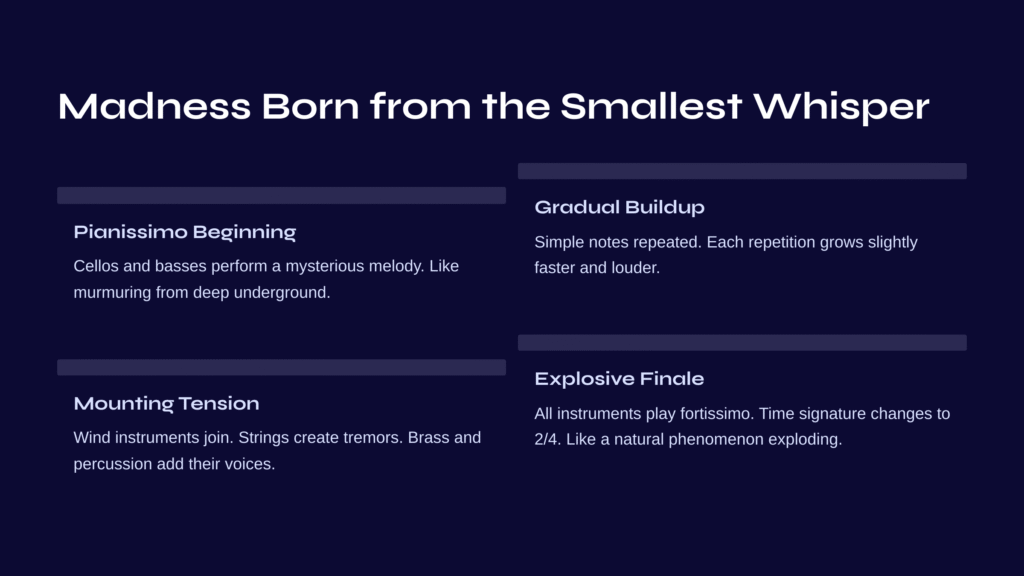
Madness Born from the Smallest Whisper
The most remarkable aspect of this piece is its beginning. Pianissimo (ppp) – the softest possible sound – as cellos and double basses perform a mysterious melody. It sounds like murmuring emanating from deep underground. In this moment, the listener has already stepped into the world of the trolls.
The melody itself is surprisingly simple. Just a few notes repeated over and over. But within that repetition lies magic. With each repetition, it grows slightly, truly slightly faster and louder. Like a heartbeat gradually accelerating. What began as a whisper becomes murmuring, murmuring becomes shouting, and shouting becomes frenzied roaring.
Through this gradual buildup, Grieg slowly heightens the listener’s tension. Like steam gradually accumulating in a pressure cooker, you can physically feel the musical energy building up. Wind instruments join one by one, the entire string section creates tremors, and finally brass and percussion instruments add their voices as the music rushes toward its climax.
By the middle section of the piece, the original slow tempo has vanished completely. Fast staccato rhythms sound like the footsteps of hundreds of trolls running about. Grieg’s orchestration here is truly masterful. Each instrumental group takes turns playing the theme, creating an effect as if the trolls are conversing with each other.
And then the final climactic section. All instruments play fortissimo (fff), and the original 4/4 time signature changes to 2/4, creating even more urgency. The sound at this point is no longer music but closer to a natural phenomenon. It’s like the primitive force of an avalanche or thunderstorm exploding.
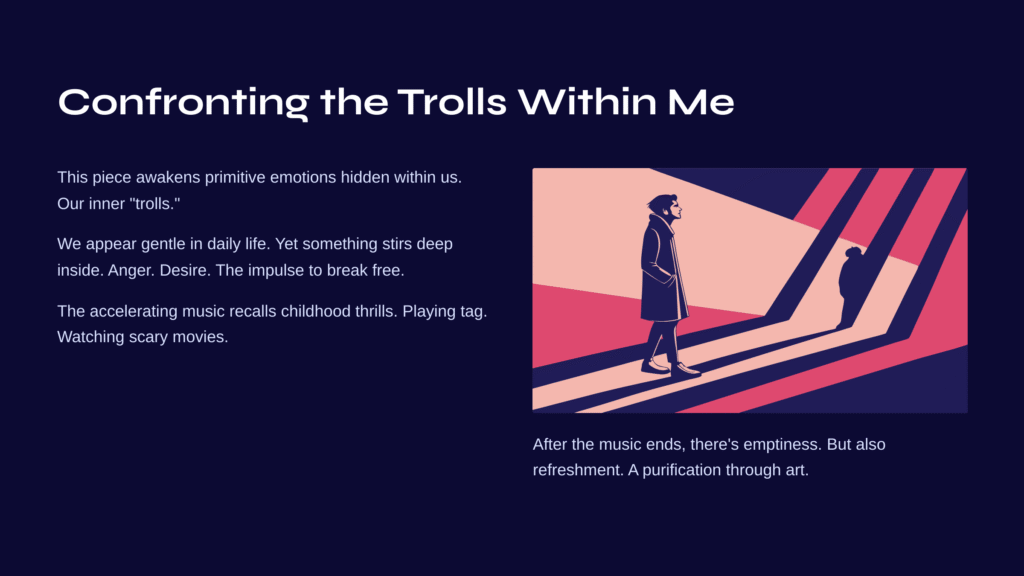
Confronting the Trolls Within Me
Every time I listen to this piece, I experience a strange catharsis. From the quiet beginning to the explosive finale, it feels as though some primitive emotions hidden within me are awakening.
We all live our daily lives appearing gentle and rational. But sometimes we feel something stirring deep within our inner selves. It might be anger, it might be desire, or it might simply be the impulse to break free. Grieg’s “In the Hall of the Mountain King” seems to musically embody these inner “trolls” that we all possess.
Particularly during the section where the music gradually accelerates toward its climax, I often recall childhood memories. The thrilling tension of playing tag with friends at the playground, or the heart-pounding excitement when watching scary movies. This piece gives us adults those primal emotions once again.
After the music ends, there’s a strange sense of emptiness. Like after intense exercise. But simultaneously, there’s a refreshing feeling as if having experienced some form of purification. Perhaps this is the power that true art provides – allowing us to release emotions we normally suppress in a safe way.

Keys to Deeper Listening
If you want to properly appreciate this piece, I recommend focusing on several points.
First, if you’re listening for the first time, use headphones or good speakers. The true charm of this piece lies in its subtle dynamic changes. To truly experience the journey from the smallest sound to explosive volume, a good audio environment is essential.
Second, focus on the tempo changes while listening. Feel how precisely Grieg controls the speed to create tension. You might even try listening with a metronome at first. You’ll be able to confirm that while the same melody repeats, it gets slightly faster each time.
Third, comparing different performance versions is also interesting. Depending on the conductor, the range of tempo changes and interpretation of the climactic sections vary considerably. Personally, I recommend Karajan and the Berlin Philharmonic’s 1982 recording. It’s a performance where dramatic contrasts and precise orchestration are well preserved.

The Timeless Dance of Trolls
I believe the greatness of classical music lies in its timeless universality. Although nearly 150 years have passed since Grieg composed this piece, “In the Hall of the Mountain King” still makes 21st-century hearts race.
While trolls, these legendary Nordic beings, may be unfamiliar to us, the inner darkness and primitiveness they symbolize still live within us. Grieg expressed this through the universal language of music, allowing us to share those emotions across time and space.
Every time I listen to this piece, I think about how all great art ultimately deals with things that touch the deepest parts of humanity. Grieg’s trolls weren’t simply monsters, but metaphors for the wildness and yearning for freedom that we all possess.
When the music ends and silence returns, we go back to our daily lives. But that time we spent dancing with our inner trolls, even briefly, makes us slightly more honest human beings. And perhaps that is the greatest gift music gives us.

Next Destination: Into the Fiery Passion of Hungary
If you enjoyed the experience of dancing with Grieg’s trolls, I’d like to recommend a piece that offers a completely different kind of excitement: Franz Liszt’s “Hungarian Rhapsody No. 2.”
If “In the Hall of the Mountain King” depicted primitive impulses gradually awakening in darkness, Liszt’s Hungarian Rhapsody is like a brilliant, passionate festival unfolding under sunlight. This piece seems to have transplanted the free spirit of the Romani people and the hot winds of the Hungarian plains directly onto piano keys.
What’s particularly noteworthy is that both pieces use “gradual buildup,” but the feeling is completely different. While Grieg gradually amplified anxiety and tension, Liszt explodes joy and ecstasy like fireworks. The initial slow Lassan section expresses deep sighs and longing, while the following fast Friska section expresses infinite vitality and freedom.
Most importantly, after listening to this piece, you’ll feel a liberation that’s the complete opposite of the inner darkness experienced in Grieg’s work. It’s like emerging from an underground cave to run across vast plains. Instead of the heavy footsteps of trolls, the light dance steps of the Romani await you.

